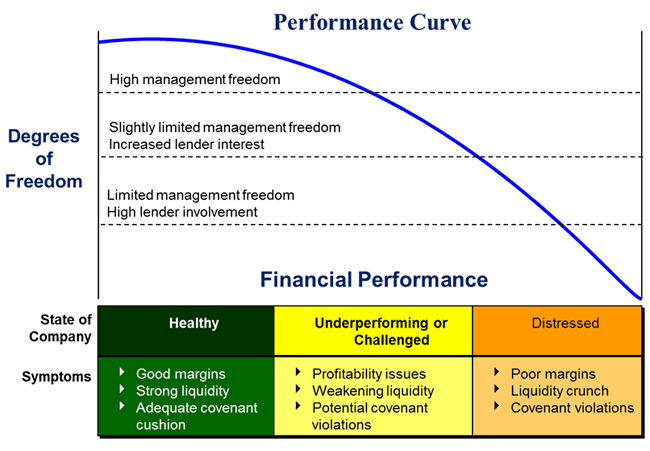No successful business owner imagines being in the middle of a crisis. But when a business turns down, knowing how to make it through is critical for the survival of the business — and for preservation of the owner’s sanity. At AlixPartners, in our roles as consultants, we’ve worked alongside entrepreneurs and family business owners for many years. Based on our experience in helping those business owners deal with challenges, we have distilled five things we believe owners should do — or not do.
1. Don’t Let Things Reach the Crisis Point Before Taking Action
In our experience, the earlier a business owner recognizes there’s a serious problem, the more options are available to address it. That’s especially true of a business whose capital structure has significant lender positions. The graph below shows that as performance worsens, a business owner should expect greater involvement from the company’s lenders. Unfortunately, many owners wait until the business is solidly in crisis mode before taking steps to try to correct problems. And many then become surprised when their lenders demand greater hands-on roles in the turnaround.

2. You Will Likely Need Help
The qualities and skills necessary to successfully start, grow, and manage a business are very different from those needed to navigate a company through a downturn. Even if lenders do not require it as part of a workout, owners would do well to consider engaging turnaround experts. Such experts typically have years of experience in developing and implementing action plans first to stabilize and then to turn around businesses that are struggling. Engaging experts gets access to the experience and knowledge necessary to stop the decline, to negotiate with creditors and vendors, and to help develop a plan that will retain as much value as possible. Many firms or individuals have experience in specific industries, thereby enabling them to prioritize which business elements to tackle first.
3. Understand It Isn’t Personal
Perhaps the most difficult emotional aspect of a business crisis is to try to remain detached enough to address the work that needs to be done to successfully navigate through the crisis. Owners sometimes fail to realize it isn’t about them as individuals; it is about money; and the task at hand is to revive the business they created. The goal is to emerge stronger and better able to operate on a sustainable basis. Working with — as opposed to against — advisors who can help accomplish those goals makes the turnaround process less confrontational and less drawn out. The process also becomes much less stressful, and the chances of success increase if owners let experts and other advisors do their jobs. Being collaborative is the best approach, and an owner who is emotionally unable to support the steps needed to save the business should consider stepping aside while those actions take place.
4. Cash is King
Ample liquidity is crucial when a crisis looms. The expression cash is king addresses a slew of vital issues. During a downturn, the ability to pay employees, vendors, and interest on company debt is paramount. It is seldom possible to quickly “grow” a business out of a slump, which means that controlling costs assumes the greatest importance. Every expense needs to be examined. Is it a must-have or a nice-to-have? A leader in crisis mode must look at every dollar going out the door to see where costs can be trimmed and how fast and how deeply cash burn rates can be reduced. Severe cuts in expenses may be very difficult; but when the future of the business is at stake, they may be the keys to survival.
By the same token, wringing every available dollar out of working capital should become a top priority. When we are called in by a company to perform a turnaround, we are constantly amazed at just how little effort is placed in trying to collect the many dollars in uncollected accounts receivable, how much inventory gets carried unnecessarily, and how often companies pay vendors early — and without adequate discounts. Understanding borrowing rates and reserves on asset-based loans enables an owner to navigate the working capital changes that can be accomplished during a crisis.
5. Control Communications
When a business is struggling, employees, vendors, lenders, and customers all pick up on the troubled atmosphere — even without official announcements. Wanting to keep the company’s struggles private is an understandable impulse, and it seems like a reasonable way to allay the real or imagined fears of employees, customers, and vendors who may leave if they feel the business might not be able to meet its obligations. We find that allowing rumors and hearsay to run rampant usually does more damage than honest communications will. We advise clients to get in front of the message because that helps control it. If there are potential problems, note the issues but also focus on the ways the company is addressing them and how those actions will make it a stronger business partner in the future. Lenders are much more likely to work with a company and assist in the turnaround process if they are informed promptly.
Conclusion
There are many reasons a company can slip into a crisis — from growing too fast or experiencing production problems to suffering the loss of major customers. Reasons beyond an owner’s control, like increasing materials costs or an overall economic downturn, can as well set the stage for a rapid slide. The speed with which a business owner recognizes problems and reacts to solve them usually determines how quickly the business will stabilize and how successful the turnaround will be. Bringing experts into challenging situations, working in partnership with them, and maximizing liquidity all help generate the momentum needed to sustain a turnaround. Keeping communications open and being in front of the message with employees, lenders, key customers, and vendors can help ensure a collaborative, supportive environment for getting the business back on track — and even building it to greater heights.